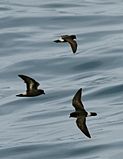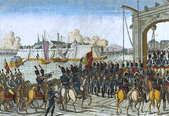From today's featured articleThe European storm petrel (Hydrobates pelagicus) is a small, square-tailed seabird with a fluttering flight. It is black except for a white rump and a white band under its wings. Most birds breed on islands off western Europe, with a separate subspecies occurring in the Mediterranean. The storm petrel lays a single white egg in a burrow. The adults share incubation and feeding the chick. This bird is oceanic outside the breeding season, wintering off the western coasts of Africa. It feeds on small fish, and can find oily edible items by smell. The chick is fed with an oily liquid regurgitated by the adults. Silent at sea, the storm petrel has a chattering call given during courtship, and the male has a purring song. The storm petrel cannot survive where rats or cats have been introduced, and it is killed by large birds such as gulls. It is classified by the IUCN as being of least concern. Folklore claiming that the bird can foretell or cause bad weather has led to its use as a symbol by some revolutionary groups. (Full article...) Did you know ...
|
In the news
On this day
More anniversaries:
|
From today's featured list
In Major League Baseball, the 300-win club is the group of pitchers who have won 300 or more games. Twenty-four pitchers have reached this milestone. The New York Gothams/Giants/San Francisco Giants are the only franchise to see three players reach the milestone while on their roster: those players are Mickey Welch, Christy Mathewson, and Randy Johnson. The first player to win 300 games was Pud Galvin in 1888. Seven pitchers recorded all or the majority of their career wins in the 19th century: Galvin, Cy Young (pictured), Kid Nichols, Tim Keefe, John Clarkson, Charles Radbourn, and Mickey Welch. Four more pitchers joined the club in the first quarter of the 20th century. Young is the all-time leader in wins with 511, a mark that is considered unbreakable. Since 1990, only four pitchers have joined the 300-win club: Roger Clemens, Greg Maddux, Tom Glavine, and Johnson. (Full list...)
Today's featured picture

|
The brown hairstreak (Thecla betulae) is a butterfly in the family Lycaenidae, with a range spanning most of the Palearctic. It is difficult to observe, spending most of its time in groups in the tops of trees (often tall European ashes on the edge of woodland, known as "master trees"), where they feed on the honeydew of aphids. The females come down to lower levels to lay their eggs on blackthorn twigs, and can sometimes be seen feeding on nectar from flowers such as hemp-agrimony, common fleabane, yarrow and bramble. The species is on the wing in late summer and early autumn; the eggs overwinter and hatch in the spring when the blackthorn buds burst. This brown hairstreak was photographed in Rila National Park, Bulgaria. Photograph credit: Charles J. Sharp
Recently featured:
|
Other areas of Wikipedia
- Community portal – Bulletin board, projects, resources and activities covering a wide range of Wikipedia areas.
- Help desk – Ask questions about using Wikipedia.
- Local embassy – For Wikipedia-related communication in languages other than English.
- Reference desk – Serving as virtual librarians, Wikipedia volunteers tackle your questions on a wide range of subjects.
- Site news – Announcements, updates, articles and press releases on Wikipedia and the Wikimedia Foundation.
- Village pump – For discussions about Wikipedia itself, including areas for technical issues and policies.
Wikipedia's sister projects
Wikipedia is hosted by the Wikimedia Foundation, a non-profit organization that also hosts a range of other projects:
Free media repository
Wiki software development
Wikimedia project coordination
Free textbooks and manuals
Free knowledge base
Free-content news
Collection of quotations
Free-content library
Directory of species
Free learning resources
Free travel guide
Dictionary and thesaurus




